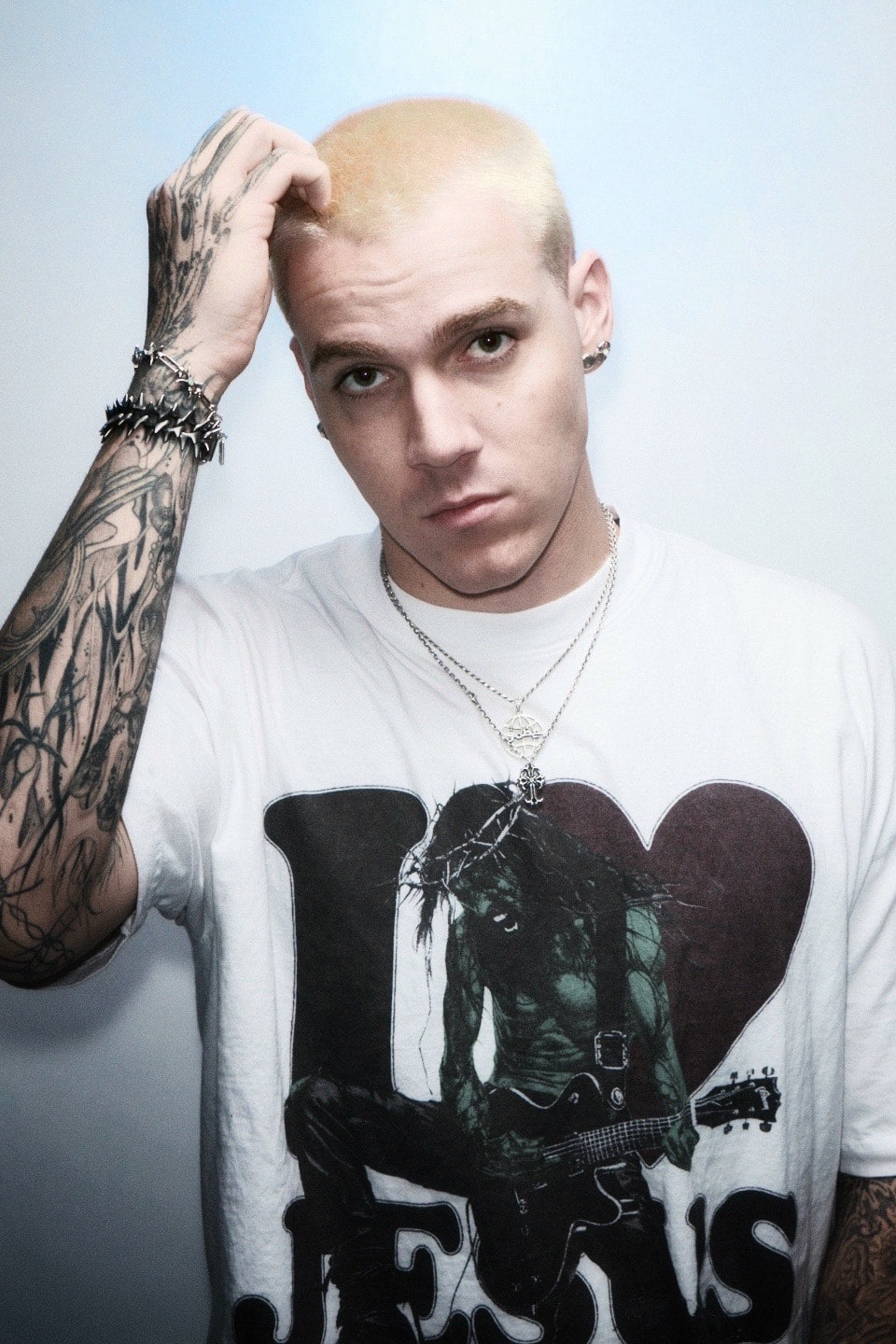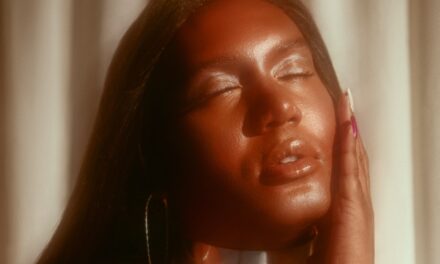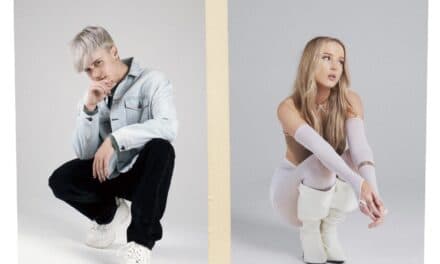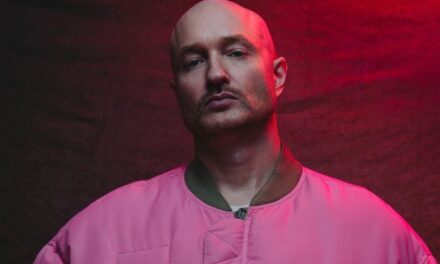Amidst the neon sunrises and humid nights of Pompano Beach, Florida, a new voice is rising from the surf and the streets. Meet Gobe (pronounced *Go Bee*), a 25-year-old artist whose blend of emotional songwriting, genre-bending sound, and tattoo artistry has positioned him as one of the most exciting new talents out of South Florida. With over 2.4 million streams across platforms and a new single”Sun Leaves Scars,” Gobe is carving his name into the culture, both literally and figuratively.
At the intersection of Indie Pop, Rock, Hip-Hop, and Punk, Gobe’s sound is both sun-soaked and soul-deep. His forthcoming single continues his streak of emotionally-charged anthems, diving into heartbreak and healing with his signature melodic grit. “‘The sun leaves scars just like people do,’” he explains. “It feels good at first, but later you realize the damage.” That’s the ethos of Gobe’s music—raw, reflective, and real.
Raised on classic rock by the beach and sharpened by South Florida’s underground rap scene, Gobe began experimenting with music as a teen—recording on his MacBook, tattooing friends, and teaching himself how to mix tracks via YouTube. But it was after an injury ended his shot at college baseball that he turned fully to music. From heartbreak and hometown blues to the beauty of self-expression, Gobe distilled it all into sound.
Songs like “Dripping Love,” “Live A Little,” “Emotional Problems,” and his collaboration with Poorstacy have earned him early praise and growing traction. But it’s “Sun Leaves Scars” that marks a major creative leap. With contributions from Andrew Kirk and Chris Penny, the track is not only a sonic evolution—it’s a statement.
Gobe—whose name reflects the mantra *Go Be Yourself*—is more than an artist. He’s a storyteller, a community-builder, and a reflection of a new creative wave rising from Florida’s shores. “I want my music to make people feel seen,” he shares. “Like they’re not alone. Like they have a song to blast in their car with the windows down that makes them feel free.”
With a clear vision, a growing fan base, and a catalog of cathartic, beach-born bangers, Gobe is ready to bring South Florida’s hybrid scene to the world stage. Inked with purpose and dripping in authenticity, Gobe is more than ready. And with “Sun Leaves Scars,” the story of this rising star is only just beginning.
Your new single “Sun Leaves Scars” uses a powerful metaphor to connect the pain of a sunburn with the emotional scars left by people. Can you walk us through how that concept came to you and how it shaped the overall sound of the track?
The concept came from simply living in the sun—being in Florida, I get sunburned all the time. I started thinking about how the sun, something that gives life, can also hurt you if you’re exposed too much. People are kind of the same way. Too much of someone, or the wrong kind of energy, can damage you emotionally. Both the sun and relationships can be beautiful, but also painful. I wanted to express emotional heartbreak in a way people could physically relate to.
Your sound blends a lot of different genres, from Indie Pop/Rock to Hip-Hop and Punk. How did growing up in Pompano Beach, surrounded by both beach culture and gritty rap, influence your musical style?
Growing up in Pompano Beach definitely had a big influence on my sound. It’s a mix of two very different worlds—on one side, you’ve got the beach vibes with a lot of guitar-driven, rock-influenced music, and on the other, there’s the gritty rap scene. There aren’t many bands from here, but there are a lot of rappers. I grew up listening to artists like Kodak Black, who’s right from around the way, and later got inspired by people like XXXTentacion and even my own friends like Poorstacy. All those different sounds and experiences shaped who I am, and my music reflects that blend.
You mentioned that your father introduced you to Classic Rock as a kid. Are there any specific artists or songs from that era that still inspire you today?
Definitely. Artists like Jack Johnson, Green Day, Red Hot Chili Peppers, Nine Inch Nails, Sublime, and even Nickelback still inspire me today. Those were the sounds I grew up hearing thanks to my dad, and they stuck with me. Each one brought something different—whether it was emotion, energy, or storytelling—and I try to carry that same diversity into my own music.

You started making music by teaching yourself through YouTube tutorials. Looking back, what were some of the biggest challenges you faced in those early days of recording and engineering your own tracks?
One of the biggest challenges early on was figuring out which plug-ins to use. I started with free ones, then saved up to buy better ones—but that caused issues too, like overloading my computer’s RAM. I eventually had to upgrade my whole setup. Once you get into recording and engineering, it becomes a nonstop cycle of improving your sound, your gear, and your overall knowledge. But once I finally got a mix that sounded clean in the car—like a real, professional track—I knew I had to keep going.
The song “Dripping Love” was a turning point for you, gaining a lot of organic traction. How did that initial success impact your confidence and approach to making music?
That moment really showed me that there was something people wanted to hear from me. It gave me the confidence I needed to start taking music seriously. When someone connects with something you created—when they feel it too—it’s powerful. It’s like your emotions become part of someone else’s story, and that kind of reaction pushed me to keep going and trust my sound.
You’ve collaborated with Poorstacy, another South Florida artist. How important is it to you to stay connected to your local music scene, and are there any other local artists you’d like to work with?
Staying connected to the local scene is important to me. We all have different lives and responsibilities, so we’re not always on the same page timing-wise—but there’s still that mutual respect and support. I work with Vaughny Vo pretty often, and Zillamatic is another local producer i work with. There are definitely a few other South Florida artists I’d love to collaborate with, but it has to happen naturally. I don’t like forcing anything—it’s got to make sense for both artists and feel right creatively.
Your tattoo work is just as much a part of your artistic identity as your music. How do those two creative outlets intersect for you? Do you find that one influences the other?
I’d say tattooing and music are two separate creative outlets for me, each serving its own purpose. Music definitely influences my style when it comes to fashion and the merch I design, but tattoos are more of a personal relationship with my clients, and hands-on artistic expression. They give me a break from making music, and music gives me a break from tattooing—it’s a balance that keeps me inspired and prevents burnout. Both are creative, but they feed different sides of me.
You’ve described your upcoming collection of songs as capturing the blend of “where the street meets the sand.” What do you want listeners to feel or visualize when they hear your music?
I want people to feel that collision of gritty and laid-back—like sunny beaches with guitars playing, rap beats in the background, sunburn, sunscreen, tequila, and sand between your toes. It’s that ‘street meets the sand’ energy—raw but carefree, emotional but still vibey. I want listeners to picture a place where summer never ends, but real life still hits.
In “Under My Skin,” you opened up about your vulnerabilities. How do you decide which personal experiences to share through your music, and is it ever difficult to be so open?
Honestly, I just pull from whatever I’m going through at the time—or sometimes from what people close to me are experiencing. I blend my own emotions with stories around me. It’s not too hard to be open because, when I’m recording, it’s usually just me and the mic. That space feels safe, and it lets me say things I might not say in a conversation. Being vulnerable like that helps me process everything and hopefully helps someone else feel understood too.
Your name, Gobe, stands for “Go Be Yourself.” As your career continues to rise, how do you stay grounded and true to that mantra amidst the pressures of the music industry?
The name Gobe comes from my last name, but the meaning—‘Go Be Yourself’—was something me and my mom came up with as part of the brand. It’s more than just a slogan; it’s a reminder to stay true to who I am. As my career grows, that message keeps me grounded. No matter what pressure comes from the industry, I’m always going to focus on being real and staying authentic to myself and my story.





